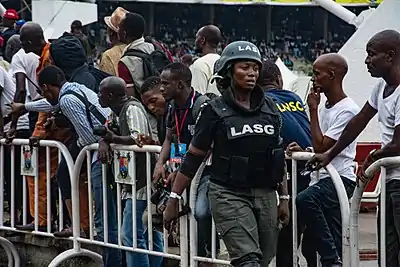Crime in Nigeria
Crime in Nigeria is investigated by the Nigerian Police.

Crime by type
Murder
Nigeria had a murder rate of 9.85 per 100,000 population in 2015.[1]
Corruption
In 2012, it was estimated that Nigeria had lost over $400 billion to political corruption since independence.[2]
Organized crime
Criminal organizations in Nigeria typically do not follow the mafia-type model used elsewhere. They appear to be less formal and more organized along familial and ethnic lines, thus making them less susceptible to infiltration by law enforcement. Police investigations are further hampered by the fact there are at least 250 distinct ethnic languages in Nigeria.[3]
Area boys are loosely organized gangs of street children and teenagers, composed mostly of males, who roam the streets of Lagos, Lagos State in Nigeria.[4] They extort money from passers-by, public transporters and traders, sell illegal drugs, act as informal security guards, and perform other "odd jobs" in return for compensation.[5][6]
Human trafficking
Nigeria is a source, transit, and destination country for women and children subjected to trafficking, including forced labor and forced prostitution. Trafficked Nigerian women and children are recruited from rural areas within Nigeria - women and girls for involuntary domestic servitude and sexual exploitation, and boys for forced labor in street vending, domestic servitude, mining, and begging.[7]
Nigerian women and children are taken from Nigeria to other West and Central African countries, primarily Gabon, Cameroon, Ghana, Chad, Benin, Togo, Niger, Burkina Faso, and the Gambia, for the same purposes. Children from West African states like Benin, Togo, and Ghana – where Economic Community of West African States (ECOWAS) rules allow for easy entry – are also forced to work in Nigeria, and some are subjected to hazardous jobs in Nigeria's granite mines. Nigerian women and girls are taken to Europe, especially to Italy and Russia, and to the Middle East and North Africa, for forced prostitution.[7]
Domestic violence
A 2012 study found that 31% of Nigerian women had been victims of domestic violence.[8] Nigerian perceptions of domestic violence vary based on region, religion, and class. For example, the Tiv people view wife-beating as a “sign of love” that should be encouraged as evidenced with the statement “If you are not yet beaten by your husband then you do not know the joy of marriage and that means you are not yet married”.[9]
All the major ethnic groups in Nigeria , especially Yoruba and Igbo , have strong patriarchial societal structures that lead to the justification of domestic violence.[10]
Child sexual abuse
Piracy
Terrorism
Jihadist group Boko Haram began an insurgency in July 2009, which peaked in the mid-2010s. Centred on Maiduguri, Borno State, they have killed carried out many attacks in Nigeria, Niger, Cameroon and Chad. They have carried out many kidnappings, bombings and massacres - killing tens of thousands of people.[11]
In September 2019, Islamic State of Iraq and the Levant stated that it killed 14 Nigerian soldiers in Borno.[12] Later in September 2019, militants in northeastern Nigeria killed at least nine people in an attack. A day later, ISIL claimed responsibility for the attack.[13]
References
- "Intentional homicide victims | Statistics and Data". dataunodc.un.org. Retrieved 2018-06-07.
- Okoye, Rita (31 August 2012). "Nigeria has lost $400bn oil revenue to corruption since Independence – Ezekwesili". Daily Post Nigeria. Retrieved 2 July 2016.
- La Sorte, Mike. "Defining Organized Crime". AmericanMafia.com, May 2006.
- Simon Heap, “Their Days are Spent in Gambling and Loafing, Pimping for Prostitutes, and Picking Pockets”: Male Juvenile Delinquents on Lagos Island, Nigeria, 1920s-60s’, Journal of Family History, 35(1), 2010, 48-70; http://jfh.sagepub.com/cgi/content/abstract/0363199009348306v1%5B%5D
- IRIN (2005-07-14). "Area Boys -- a growing menace on the streets of Lagos". NEWSfromAFRICA. Koinonia International. Archived from the original on 2007-05-19. Retrieved 2007-03-03.
- Momoh, Abubakar (2000). "Yoruba Culture and Area Boys in Lagos". In Jega, Attahiru (ed.). Identity Transformation and Identity Politics under Structural Adjustment in Nigeria. Nordic Africa Institute. p. 184. ISBN 91-7106-456-7.
- "Nigeria". Trafficking in Persons Report 2010. U.S. Department of State (June 14, 2010).
 This article incorporates text from this source, which is in the public domain.
This article incorporates text from this source, which is in the public domain. - "Nigeria." Social Institutions & Gender Index. Social Institutions & Gender Index, n.d. Web. 01 May 2016.
- Oyediran, KA and Isiugo-Abaniher, U. "Perceptions of Nigerian women on domestic violence". African Journal of Reproductive Health, 2005
- Kritz MM and P Makinwa-Adebusoye. Ethnicity, work and family as determinants of women's decision-making autonomy in Nigeria. Population and Development Program. 2006
- Emerson, Stephen; Solomon, Hussein (2018-01-24), "Terrorism and extremism", African security in the twenty-first century, Manchester University Press, doi:10.7765/9781526122742.00010, ISBN 978-1-5261-2274-2
- "Islamic State says it killed 14 Nigerian soldiers in northeast Borno state: Amaq". Reuters. 2019-09-25. Retrieved 2019-09-26.
- "Islamic State claims attack on soldiers in northeast Nigeria". Reuters. 2019-09-30. Retrieved 2019-09-30.